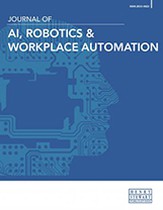Using AI to minimise bias in an employee performance review
Abstract
Performance reviews are intended to be objective, but all humans experience bias. While many companies opt for group reviews as a way to de-bias and challenge the status quo, what is being said in those meetings, how those comments are said and the context for those remarks are just as important. At the same time, most people’s attention span is of shorter duration than a review and being promoted depends on what bosses remember about their direct reports, their subjective measure of employee success, and their ability to convince others that employee accomplishments are deserving of a reward. As a result of these compounding factors, meta-bias patterns emerge in company culture. Combine those limitations with the fact that reviews are often a breeding ground for subtle — and not-so-subtle — bias, and it begs the question: Why are we not using technology to help? With developments in natural language processing (NLP) and conversational AI (CAI), computers can identify biased phrases in real time. Although these technologies have a long way to go to match human nuance, we can at least flag problematic phrases during something as significant as performance reviews. And with the right inputs rooted in social science and normalised based on geography, contextual relationships and culture, we could be surfacing insidious bias throughout organisations. This paper examines how a future CAI tool could reduce bias and, eventually, teach people to re-evaluate and reframe their thinking. In a performance review setting, the system would flag problematic phrases as they are said, and committee heads would stop the conversation. The committee would then evaluate the comment, ask the presenter for further information, and only continue once there is sufficient clarity. Once the discussion concludes, the review cycle would continue until another phrase is identified. The system serves to be persistently aware throughout all conversations and highlight potential bias for everyone to learn from. Beyond pointing out biased phrases during a performance review, a combination of NLP and CAI can serve as a foundation for company-wide analytics. Organisations can track who is speaking in a majority of meetings, what was said, who challenges biased phrases, whether or not certain types of people are misrepresented in reviews more or less frequently, and so on. All this information gives a fundamentally new picture of what is happening inside a company, laying the groundwork for human resource (HR)-related metrics that individuals (and the company as a whole) can improve over time.
The full article is available to subscribers to the journal.
Author's Biography
Liz Melton After graduating with a BA in human biology and an MS in biology from Stanford University, Liz ventured into the world of tech, starting her career as a Salesforce consultant at Accenture. Since her stint in consulting, she has held positions in customer success, partnerships and operations at Molina Healthcare, BlackLine, Retina AI and mParticle, cultivating relationships with external clients and partners such as Target, Nestle, Madison Reed, Experian, TransUnion and Databricks. Outside of her nine-to-five, Liz is passionate about helping start-ups evangelise their products through the written word. Over the past three years, she has honed her craft working part-time on blog posts, eBooks, case studies and whitepapers for companies like Airtable, Outreach, Marketo, Magento, Talend, JumpCloud, Achievers and more. Liz has also written for venture capital companies such as Firstmark Capital and Insight Partners. In her free time, Liz volunteers at Seed Consulting Group, writes for the newsletter Boring Startup Stuff and hikes all over Southern California.
Grant Riewe is a technologist and strategist focused on big-bet innovation. He currently serves as Chief Technology Officer for Vibrant Emotional Health, a non-profit working with the US Government to expand access to mental and emotional healthcare crisis services through the National Suicide Prevention Lifeline and the national 988 number. Grant is also an Executive Fellow with the Opus College of Business, University of St Thomas (Minneapolis, MN) and a strategic adviser to a variety of organisations. Formerly a consultant with both McKinsey & Co. and Accenture LLP, Grant holds a BA in mathematics from St Olaf College (Northfield, MN) and an MBA from the Carlson School of Management, University of Minnesota. He is also an avid musician, woodworker and baker.
